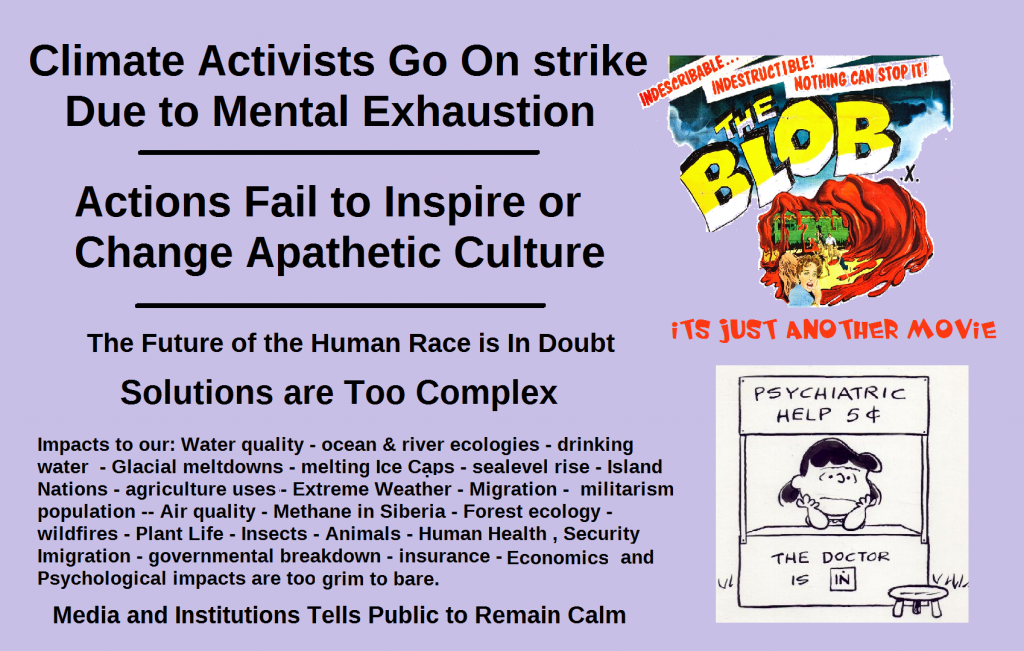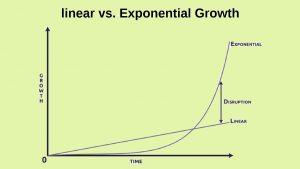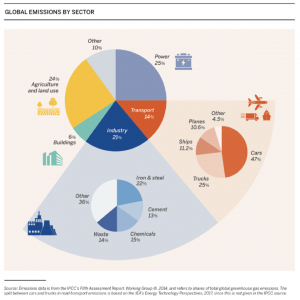
The above image is an introduction to the psychological impacts of climate change faced by a growing number of us. The past year has set off many climate-related alarm bells due to wildfires and extreme weather. After decades of exposure to its corrosive mental effects, experts, activists, and the public are experiencing increased levels of trauma. This presentation will walk you through the mental implications and resources currently available. Our established institutions, especially the media, have failed to help us deal with the climate crisis. We are on our own for now.
This story was written based on a review of almost 1,000 December 2019 climate articles. Less than ten of the stories mentioned the subject of psychological impacts. Please share this with anyone you know who is expressing fears about the climate crisis. You might help save their life. I still have my college textbook about “global warming” before working at Greenpeace in the 1970s. My first experience with the impacts of climate on our mental stability came during a national green party conference in the mid-1980s. I was shocked as a climate scientist fell apart mentally when the group failed to make climate the top issue. A list of articles referenced in this work is at the bottom of this piece.
 In this recent article, a therapist set up an iconic Peanut’s booth known as The Doctor is In at
a local public venue. She found that nearly 60% of those who visited
the booth were worried about climate change. According to a psychologist
in the same piece, 100% of the western world is impacted. An excellent
example of this kind of avoidance appeared in this Australian wildfire
article where the author blames public apathy!
In this recent article, a therapist set up an iconic Peanut’s booth known as The Doctor is In at
a local public venue. She found that nearly 60% of those who visited
the booth were worried about climate change. According to a psychologist
in the same piece, 100% of the western world is impacted. An excellent
example of this kind of avoidance appeared in this Australian wildfire
article where the author blames public apathy!A family member, who has never expressed concerns about the climate issue, sent me a recent Washington Post story about the Santa Barbara wildfires. The article mentioned a freak 3-hour heatwave on July 6th, 2018. Temperatures jumped 25 degrees late in the afternoon to 115 degrees, killing innumerable animals in the area. The article also highlighted the fact that Santa Barbara, the home of the environmental movement’s Earth Day, has failed to meet its climate goals under pressure from the local business community because of America’s entrenched lifestyles. The Post’s narrow and sensationalist format here fails to mention either the ten-fold increase of global wildfires since 2001 or Australia’s horrific fire season. Furthermore, the Post didn’t promote their own poll that 46% of Americans want the country to stop using fossil fuels!
Check out this article for a broader review of mental impacts on the general public. For the best overview, you will want to download this important mental health guide by the American Psychological Association. As climate-related events grow, we can expect more people to experience Solastalgia (you probably have this), PTSD, and other symptoms. Our human frailties must be confronted individually and by society. For those of us who acknowledge that we are part of the natural world, some are reaching out to Eco-psychologists for help. Other people dealing with their trauma are turning to activism, meditation, or spiritual activities.
One of America’s biggest problems is how we stigmatize mental illness, and its correlative, mental health. Many of us, especially men, use avoidance as a solution. The Association of Psychological Science estimates that 60 million Americans suffer some form of mental illness annually, and 40% use avoidance to deal with it. Doesn’t this sound a lot like the root cause of the climate denial issue? Climate activists who deal with communication should be aware of The National Alliance for Mental Illness’ 9 major steps to help deal with stigma. Nor can the mental health impacts resulting from the corporate media be overstated. Their manipulative advertising techniques and promotion of stigma are legendary. Last but not least should be a look at how politicians and social media are using neurotic profiling.
The Lucy booth presentation also looks at the political demographics. This includes the primary denial group in charge of the system, the wealthy, well-educated white men. The toughest question is whether we can flip their denial. Many strategists say that the 2020 election is the most important ever, giving us nine months to do this. We have a long way to go to address the main problems of global consumption, the planet’s carrying capacity, fossil fuels, water, agriculture, and dead soils.
There are hopeful signs of change all around us. For example, the TED Talk video by a billionaire titled Beware, fellow plutocrats, the pitchforks are coming* in which, Nick Hanauer makes the case that our trickle-down economics is destroying the country. He believes that a vibrant middle class is a critical foundation for a stable society. The biggest danger he sees is the economic injustice orchestrated by the wealthy elite. Some of his ideas are weak, but his warning that pitchforks will come if plutocrats don’t change is important. This goes for the climate deniers as well. By contrast, the New Yorker just documented how many super-rich people are building doomer bunkers.
The fossil-fuel divestment movement is one area of positive news. The biggest story is Goldman-Sachs decision to no longer fund coal development. Then BlackRock, the world’s largest asset manager, joined the Climate+100 group. This group controls $41 trillion in assets, calling for sustainable alternatives to fossil fuels. In 2018, global coal growth (map) leveled off for the first time. The fossil fuel industry has created its own Iron Triangle as denier’s like Trump and rail companies continue their stonewalling. So, for now, all resistance is at the state or local level.
Meanwhile, a Silicon Valley think tank called “Singularity University” has been promoting the concept of disruptive technologies and exponential thinking. This concept of exponential growth and how quickly societal change can take place is worth a closer look.
What is Exponential Versus Linear Thinking
and Can it Make a Difference?
 As
individuals, our brain merges all of our activities, senses, and
thoughts into a single stream of linear consciousness. Individuals are
not good at multitasking, but this is not the case when it comes to our
collective existence. Important changes can spread exponentially through
society. A good example of exponential change was the development (or
the) expansion of the ozone hole with
the world quickly phasing out Freon worldwide. But the Ozone hole will
take fifty years to heal and still plays a role in climate disruption.
As
individuals, our brain merges all of our activities, senses, and
thoughts into a single stream of linear consciousness. Individuals are
not good at multitasking, but this is not the case when it comes to our
collective existence. Important changes can spread exponentially through
society. A good example of exponential change was the development (or
the) expansion of the ozone hole with
the world quickly phasing out Freon worldwide. But the Ozone hole will
take fifty years to heal and still plays a role in climate disruption. Understanding how social change works has been around for decades. Bill Moyer first devised this social change model known as the Movement Action Plan. Exponential growth can occur in a variety of ways. Whether it’s around economics, physics, cultural phenomena, or climate impacts, too few of us understand exponential change. A great example of this is Al Bartlet’s Arithmetic, Population and Energy – and the exponential function. * In this must-see video, Bartlett documents the frightening exponential growth of coal.
Another variation of exponential phenomena is the domino effect, as demonstrated at the beginning of this video on climate change. While Stanford’s Tony Seba’s video * shows how exponential strategies can impact transportation and climate. The most powerful example in his video is demonstrated by how quickly society moved from the horse and buggy era to the car.

It is our potential for exponential change that is the best hope we will survive the climate crisis.
The Harder They Come, The Harder They Fall
The climate community needs a triage based response about how it targets specific audiences. Western Civilization needs a full stop reverse course process put in place, but that is not what we are seeing. Some climate activists call this degrowth.
There is a split between most climate activists and institutional researchers about how to reverse climate denial. This split was evident at the recent COP event in Spain. The biggest problem, however, is how to communicate with deniers or key stakeholders, like the fossil fuel industry. Psychologists and social scientists are now weighing in on how to communicate with climate deniers. Social scientists have proposed the following ten principles of good communication. Climate experts like Per Espen Stoknes, who acknowledge apocalyptic fatigue, are calling for better strategies.
After 40 years of climate campaigns, Eco-psychologists are now treating traumatized activists. Madrid’s COP-25 gathering has been described as a near failure, even though UN leaders warned that we are reaching a point of no return. So, have we reached the climate and human inflection point yet? Australia’s wildfires, the worst ever, could very well be it.
Just Don’t Stand There! Do Something!
 One of the most important solutions to climate despair is doing something about it.
The most important, of course, is to talk about the issue regularly and
bring it up with your family and friends. Please see the lifestyle
section for more.
One of the most important solutions to climate despair is doing something about it.
The most important, of course, is to talk about the issue regularly and
bring it up with your family and friends. Please see the lifestyle
section for more.Climate Caroling In Your Neighborhood
Go take a walk just before bedtime. See how many of your neighbors are leaving lights on. You might just be surprised if not shocked to see how many lights people are leaving on all night, especially outside lighting. You can do something about people’s behavior, even those that think the climate is a non-issue. You can put together a friendly flyer and put it in their mailbox, or on their steps suggesting that they can actually still retain their sense of security and safety while saving money and our climate.
Go out and be a neighborhood climate activist. The flyer should include information about motion sensor light bulbs and where to get them. These light-bulbs will turn on or off when anyone is within ten feet (products vary). The bulbs are not cheap (they are cheaper on Amazon) but will soon pay for themselves. Inside lights, can also be replaced with inexpensive LED nightlights. If you know a concerned neighbor, put some songs together and go out and sing them at people’s doors. “Tis the season to save the climate.” Keep track of how many neighbors respond. Take the idea to your city representatives and urge them to fund a serious campaign. Assume that most people who leave their lights on at night are not just conservative but also frightened about security. Focus on this with only a minor accent on climate.
In Conclusion
Not too long ago, a Dene elder was taken to a spot overlooking the city of Los Angeles. Shocked by what he saw, he realized at that moment why his people’s lands were being exploited by mining. Humans, as do other animals, have the capacity for caring until it’s beaten out of them. This is one battle that humanity can’t afford to lose. The global community wants to change! Overcoming inertia, and the allies, and profiteers of the fossil fuel industry are the challenges.Will it be Australia that finally wakes the world up? We are not there yet, as a recent poll found that only a few are willing to accept a $1 a month tax. This crisis is about the media’s failure to inform people worldwide. Have you ever seen a major network do a prime time TV program on reversing climate change? Their climate coverage tactics are responsible for people’s growing psychological impacts.
Very few people fully understand the role media’s plays in climate change. Not a single major network has ever shown the BBC’s “Century of the Self” documentary about the media’s role in manipulating us. We desperately need a new era of media literacy now that Chomsky or McLuhan have long become outmoded by social media and promotion of the Internet Of Things.
Italian cancer victim wins case against 5-G technology
Peru is protecting Machu Picchu by planting one million
trees to guard against mudslides and fires.
Protests continue in
France against pension “reform” as activists are joined by teachers’
unions, doctors, lawyers, and railway
workers.
Wombats in Australian fire-affected areas not only allow
other animals to shelter in their deep, fire-resistant burrows, but actively
herd other animals into them.
Music above all things: Scientists discover that playing
normal coral reef sounds brings dead corals back to life.
Massive victory as BlackRock CEO promises to center climate
change in investment strategy.
Harvard Law School students disrupt recruitment event,
calling on major law firm to #DropExxon.
The international Communications University is born.
Atlantic Coast Pipeline loses permit battle with
historically black community.
St. Louis prosecutor sues police union under KKK law for
racist practices.
Climate groups thank Sanders for being only candidate at
debate to stand against Trump-led trade deal.
Schumer praised for joining Sanders in voting against Trump
trade deal that ignores climate crisis.
Richmond, California
bans coal, blocking key export route to Asia.
House to consider Lee and Khanna-backed measures to stop
Trump’s march to war with Iran.
Minneapolis joins with 90 U.S. cities to say US troops out
of Iraq – no war on Iran.
House Democrats demand ICE release transgender detainees:
“not one more life should be lost.”
House Democrats open investigation into inhuman Trump policy
forcing asylum seekers to Mexico.
Jorge Garcia, Michigan dad deported after 30 years in US,
wins fight to return home.
House votes to protect scammed students, and blocks DeVos.
House Committee holds hearing about cannabis policies for
the next decade.
Two-thirds of people in the U.S. want to tax the rich.
Nearly all Americans want to get off fossil fuels (but will
the media tell it like it is?)
Treasury opens investigation tax break for poor being
exploited by rich, including Kushner family.
Seattle bans foreign-influenced corporations from political
spending in local elections.
Federal civil rights office to investigate detention and
questioning of Iranian Americans at border.
Senator Harris calls
for halt to GOP nominations of judges during impeachment. GOP complies.
Federal judge blocks Trump order allowing localities to
refuse new refugees.
New Illinois law clears way for undocumented and transgender
students to access state financial aid.
Rep. Elijah Cummings wanted $1 million in reelection funds
sent to youth programs after his death.
Citing threat from armed groups, Virginia governor declares
emergency and bans guns at state capitol.
Women no longer 3/5 of person as Virginia becomes 38th state
to ratify the ERA, nearly 100 years after women activists endured force feeding
to advocate e for women getting the vote.






No comments:
Post a Comment